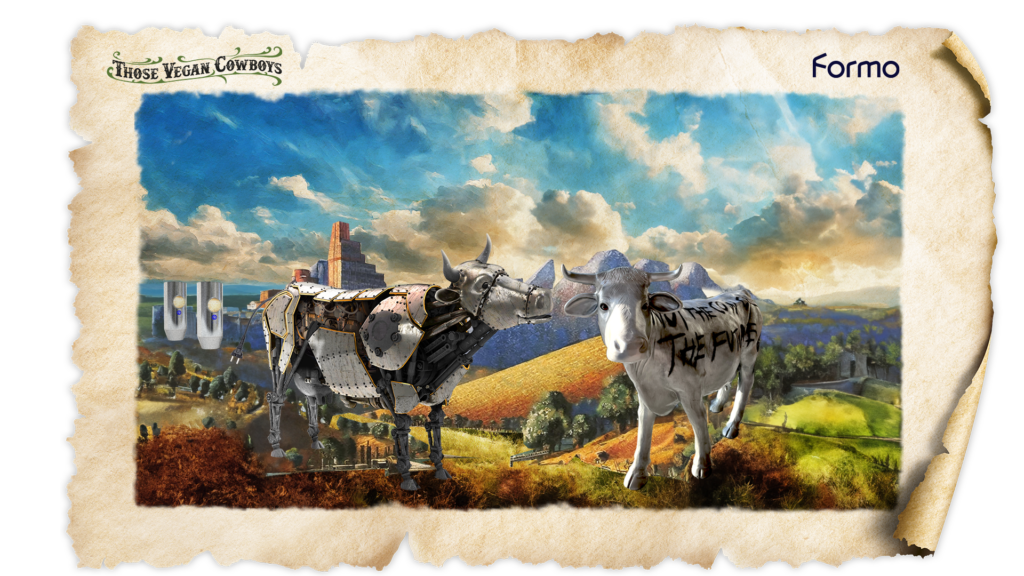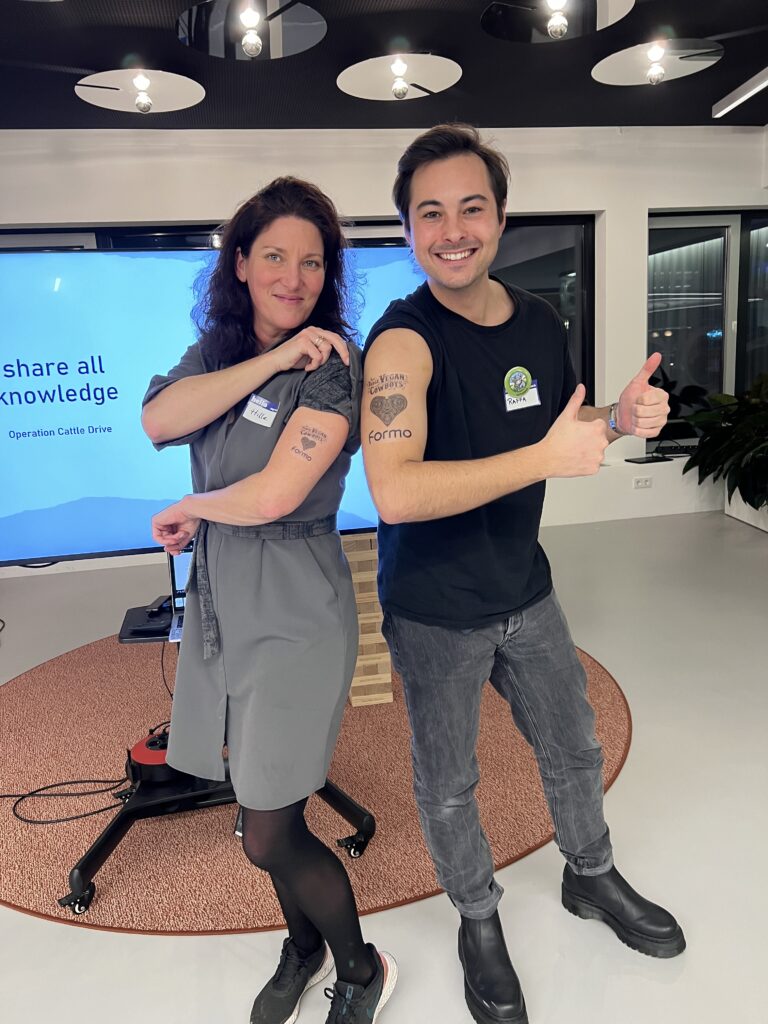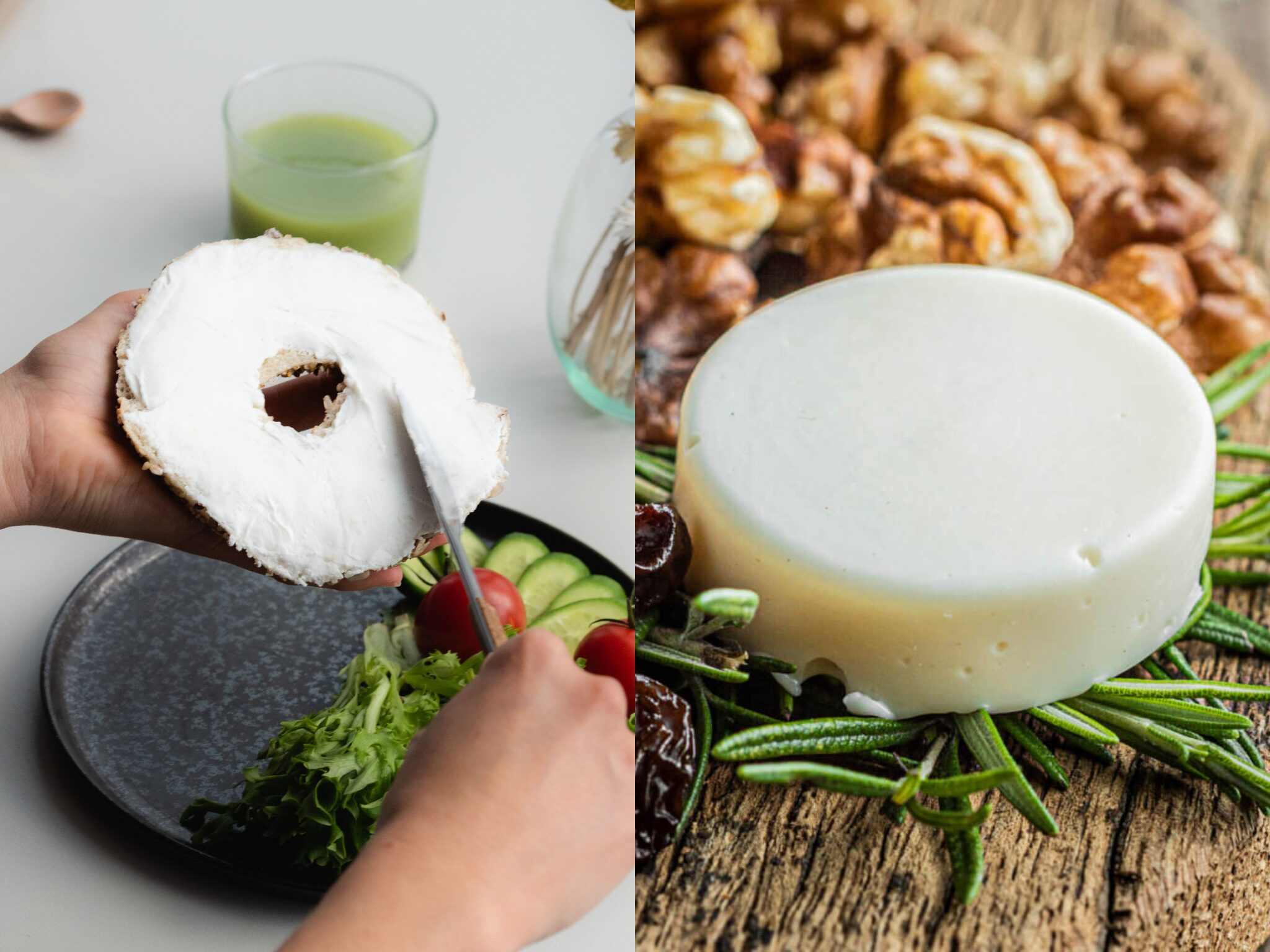Formo & Those Vegan Cowboys Join Forces to Bring Animal-Free Cheese to EU Shelves
7 Mins Read
European precision fermentation leaders Formo and Those Vegan Cowboys have announced an R&D partnership to advance the production of their casein proteins and bring animal-free cheeses to the EU market. The collaboration combines their tech and manufacturing operations, with the brands maintaining their separate identities.
Formo and Those Vegan Cowboys have formed a strategic alliance to advance their efforts to produce animal-free casein proteins and break through regulatory barriers in the EU to bring precision-fermented dairy products to the market.
The collaboration will see the startups unite R&D operations across strain engineering, bioprocessing and large-scale production, with several key goals outlined. This includes achieving price parity with conventional casein (which, at 80%, is the most abundant protein group found in dairy), expediting the regulatory approval process, and accelerating and evolving the boundaries of science-based entrepreneurship.
With the combined research expertise of over 60 scientists, the ultimate aim is to introduce precision-fermented cheese to supermarket shelves in the EU. The teams are working together in both R&D facilities: Formo’s in Frankfurt and Those Vegan Cowboys’ in Ghent. “We have the teams on the ground, going back and forth and constantly exchanging data. We are co-producing casein in either one of our pilot facilities, as well as jointly with contract manufacturers,” Hille van der Kaa, CEO of Those Vegan Cowboys, tells Green Queen.
“The focus [of the] joint development agreement is on casein optimisation and industrialisation,” she adds. “It does not currently extend to food science and product development, which is the field that the companies continue to work on separately. Furthermore, any commercialisation efforts will be pursued separately. Both companies remain entirely independent entities.”
Combined resources will speed up animal-free cheese

Those Vegan Cowboys is the brainchild of Dutch entrepreneurs Jaap Korteweg and Niko Koffeman, the founders of the wildly successful plant-based meat brand The Vegetarian Butcher, which was sold to Unilever in 2018 for an undisclosed sum. The company is currently in the middle of a €15M fundraising round, and is working on Camembert, Brie, Feta and Gouda-style cheeses (both young and old).
Meanwhile, Berlin-based Formo was founded in 2019 by Wohlgensinger and has raised $54.7M in total funding. It makes fermentation-derived egg alternatives and dairy proteins for animal-free cheese applications. It aims to launch the former, called What Came Third, through the B2B channel in Germany this year, while its first-generation cheese lineup includes Frischhain, Camembritz, Hellasdorf and Frankoforte, also set to roll out in its home market in the coming months.
But these products use koji mould, which is not considered a novel food under EU regulations. Its casein-based cheeses, however, will be, as they use a different fungi strain. Casein is the dairy protein that makes cheeses stretch and melt. It’s responsible for emulsification attributes, which help prevent water and fat from separating, allowing producers to make any kind of cheese with traditional cheesemaking processes. The two companies are independently working on cheeses like mozzarella, parmesan, gouda and other casein-based options, which will hit shelves in 2025, initially outside Europe.
Formo CEO Raffael Wohlgensinger confirms that the collaboration will explore multiple strains for fermentation. It will deliver technologically efficient gains and bundle their manufacturing volumes together. “Through our approach, we show how collaboration among ventures can unlock unprecedented levels of speed, efficiency and impact. It represents a transformative leap to advance the precision fermentation space as a whole and thus spearheading the charge towards a more sustainable future,” he says.
It will help them achieve price parity for precision-fermented casein and the resultant dairy products too. “In order to gain a leading market share together with our partners, production of animal-free casein needs to be able to compete with animals on a cost level,” says Wohlgensinger. “The initiated collaboration allows us to improve the technological efficiency and scale of production to achieve this very goal.”
Expanding on this, he tells Green Queen: “At current scale, we still are asking a price premium over animal-sourced casein. This is exactly where our collaboration shines though – until now, nobody was able to show how technology efficiency and scale will lead to competitive prices that allow precision fermentation to move out of the niche. By teaming up, we will get there much quicker than anybody else. Hence, we will reach parity within the next three years, and then undercut conventional prices within the decade, because our joint technology has a systemic advantage.”
The two European startups outline the importance of change in the dairy sector, which brings with it a host of environmental and supply chain challenges. Dairy production from cattle alone makes up 8% of total human-caused methane emissions. While most life-cycle assessments (LCA) of precision fermentation deal with whey, one study conducted by France’s Standing Ovation, found that animal-free casein emits up to 94% fewer greenhouse gas emissions than its conventional counterpart (although the LCA was done at pilot scale, and an industrial-scale analysis would provide a more rounded picture).
Other players in the precision-fermented casein space include Austria’s Fermify, Australian-American producer Change Foods, and Indian startup Zero Cow Factory.
Overcoming regulatory and legislative barriers

Formo has conducted multiple studies over the years to determine consumer sentiment on dairy products made from precision fermentation. One survey from 2021 by Formo and the University of Bath in 2021 found that 79% of Europeans were likely to try precision-fermented dairy products. Another published last year alongside the University of Saskatchewan revealed that 79% of people looking for animal-free cheese will have previously sought dairy-based cheese.
There certainly is consumer interest, and the joint R&D operations will help both Formo and Those Vegan Cowboys advance their efforts to launch precision-fermented cheese. But none of it matters without regulatory approval from the European Food Safety Authority. The EU classes products made from precision fermentation as novel foods, which means they require premarket authorisation.
But the bloc has the strictest regulations surrounding novel foods anywhere in the world, which has driven away homegrown companies to enter the market elsewhere, and dissuaded foreign businesses from launching into the EU. It’s the reason why Europeans can’t eat Impossible Burgers, which contain its trademark heme ingredient, derived from precision fermentation.
“We have this amazing technology with the potential to solve multiple acute problems in our food system at once. But with current legislation timelines, we see companies submit their applications in the USA and Asia – we need more speed and efficiency when it comes to European dossiers,” explains van der Kaa.
So far, only New Culture has cleared regulatory hurdles anywhere in the world, earning self-affirmed GRAS status in the US last month. No company has received the go-ahead from the EFSA for precision-fermented products. “That is why, as European precision fermentation companies, we formed the Food Fermentation Europe alliance, so we can address EU legislation with one voice,” she adds. Teaming up will allow Those Vegan Cowboys and Formo to “double down on [their] efforts”.
The startups plan to strategically pool their resources, leverage established dialogues with the EFSA, and utilise their roles as FFE founders to speed up the regulatory approval process. They also note that the EFSA has previously expressed strong support for joint dossiers, which could enhance efficiency. “Through Food Fermentation Europe, we have established a very constructive dialogue with EFSA and their message was clear: collaborate and we can move faster,” notes Wohlgensinger.
“We are working on our joint European dossier and are planning to submit this year. We expect the time to EFSA approval to take 24 months as a preferred, combined application,” van der Kaa reveals, noting that “getting to scale at [a] competitive cost and getting regulatory clearance fast” are the biggest hurdles facing the precision fermentation sector. “Stronger, faster, together is the name of the game and we are excited to take on these challenges together,” she adds.
Wohlgensinger, who feels there isn’t a level playing field with animal-based dairy products in Europe, says part of the challenge remains legislative too. “We are looking to level this with regards to naming and labelling opportunities, as well as subsidies received. The Common Agricultural Policy is outdated [and] will be revisited in the new mandate of the European Parliament, and we will ensure that alternatives get their rightful place in it,” he explains.
“We are also looking to have precision fermentation become an integral part of the EU protein strategy and the EU bioeconomy strategy – two legislative files that can pave the way for European competitiveness and food resilience.”
While he welcomes the high standards set by the EU regulations on ingredients like its casein, and acknowledges the subsequent time delay, the Formo CEO believed execution needs to be faster: “And for that, the European Commission needs to allocate additional resources to EFSA. The bottleneck is not concerns on food safety – it’s the lack of manpower within EFSA.”



